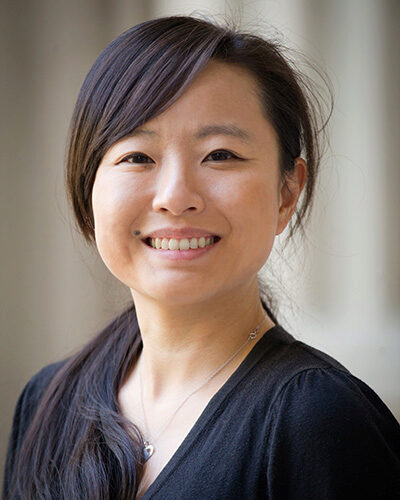November 29, 2021
Ellen Mazumdar, an assistant professor in the Woodruff School of Mechanical Engineering, has received an Air Force Office of Scientific Research's Young Investigator Award (YIP) to further explore "Improving Rate-controlling Processes in Multiphase Detonation Systems.”
This year’s awards total approximately $16.2 million in grants awarded to 36 scientists and engineers from 30 research institutions and businesses. YIP recipients receive a three-year grant totaling $450,000.
"We are excited that AFOSR is supporting our research into understanding fundamental rate-limiting mechanisms for liquid-gas and solid-gas multiphase detonations,” said Mazumdar. The ability to understand and control these fundamental combustion mechanisms is important for a host of Air Force relevant areas. “One day, we hope that this research will contribute to the design of novel engines, propulsion systems, and energetic materials."
Mazumdar hypothesizes that overcoming key rate-limiting processes associated with droplet and particle breakup, temperature, and surface chemical reactions will greatly improve detonation speeds. In order to test this hypothesis, she and her group aim to first investigate the key rate-limiting detonation mechanisms in heterogeneous fuels at micrometer length scales and nanosecond time scales using optical diagnostics. Then, Mazudmdar’s team aims to explore how additives and coatings can be used to alter the key rate-limiting mechanisms as well as accelerate reactions, promote detonation stability, and improve energy output. Finally, she plans to couple experimental data with simulations to derive difficult-to-measure parameters.
Mazumdar began as an assistant professor in the Woodruff School of Mechanical Engineering in 2019. Her research group currently focuses on developing new sensor systems and diagnostic techniques for robotic, combustion, fluid, and hypersonic applications. Her group studies these physical phenomena using interdisciplinary tools including magnetostatics, spectroscopy, ultra-fast laser optics, digital holography, stochastic system identification, machine learning, and mechatronics. She received her Ph.D. in Mechanical Engineering from MIT and completed a postdoctoral research position at Sandia National Laboratories in Albuquerque, NM.
The YIP is open to United States citizens and/or permanent residents’ who are scientists and engineers at United States research institutions who received Ph.D. or equivalent degrees in the last seven years and show exceptional ability and promise for conducting basic research of military interests.
The objective of this program is to foster creative basic research in science and engineering, enhance early career development of outstanding young investigators, and increase opportunities for the young investigators to recognize the Air Force mission and the related challenges in science and engineering.
This year, AFOSR received over 175 proposals in response to the AFOSR YIP Funding Opportunity Announcement (FOA) solicitation, FOA-AFRL-AFOSR-2021-0006. Thirty-six YIPs were awarded in these research areas: Aerospace Composite Materials, Aerospace Materials for Extreme Environments, Agile Science for Test and Evaluation, Atomic and Molecular Physics, Cognitive and Computational Neuroscience, Complex Networks, Computational Cognition and Machine Intelligence, Computational Mathematics, Condensed Matter Physics, Dynamic Data and Information Processing, Dynamics Materials and Interactions, Dynamical Systems and Control Theory, Electromagnetics, Energy Combustion and Non-Equilibrium Thermodynamics, GHz-THz Electronics and Materials, High Speed Aerodynamics, Human Performance and Biosystems, Laser and Optical Physics, Mathematical Optimization, Mechanics of Multifunctional Materials and Microsystems, Molecular Dynamics and Theoretical Chemistry, Multi-Scale Structural Mechanics and Prognosis, Natural Materials and Systems, Optoelectronics and Physics, Organic Materials Chemistry, Physics of Remote Sensing, Plasma and Electro-Energetic Physics, Propulsion and Power, Quantum Information Sciences, Science of Information, Computation and Fusion, Space Science, Trust and Influence, Ultrashort Pulse Laser-Matter Interactions, and Unsteady Aerodynamics and Turbulence Flows.

